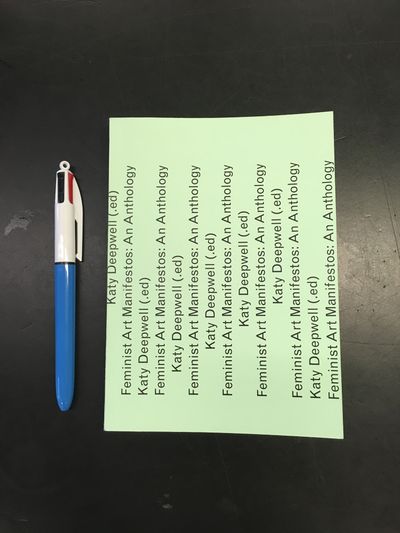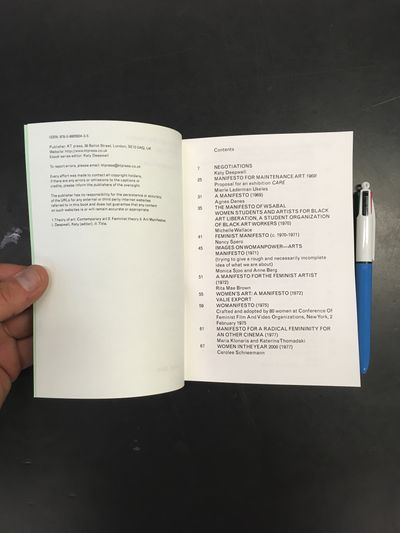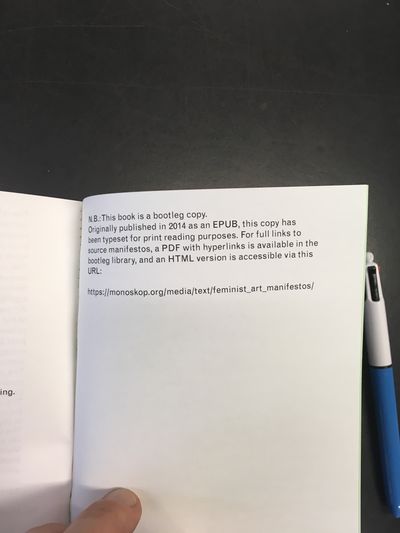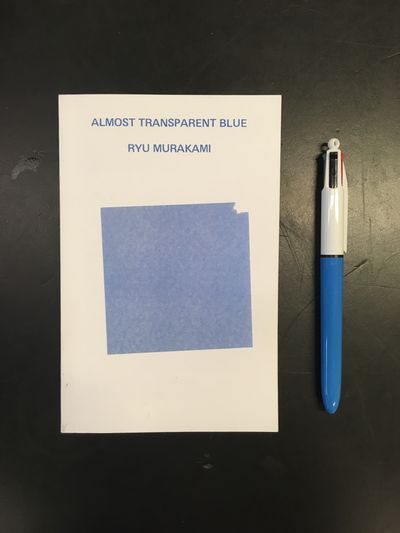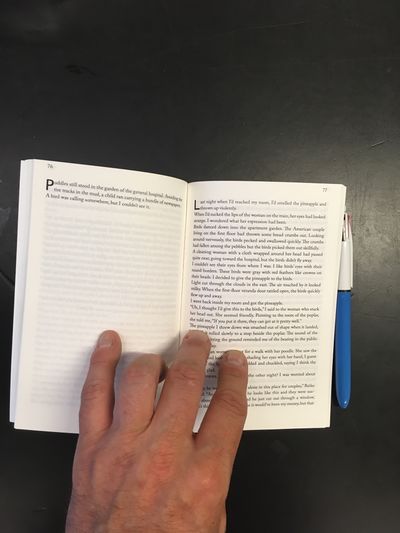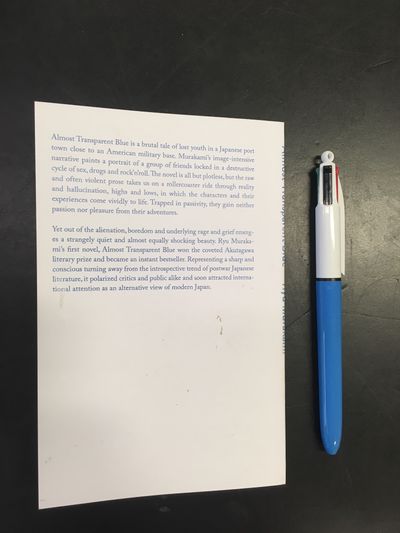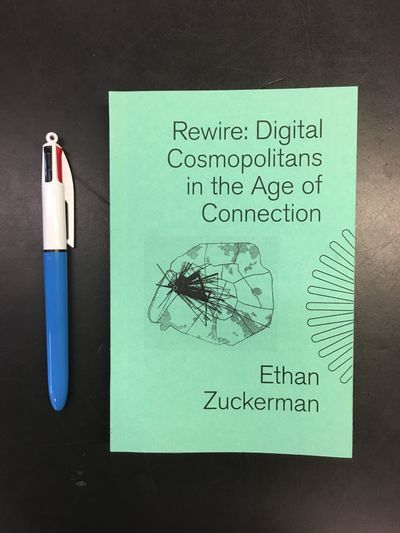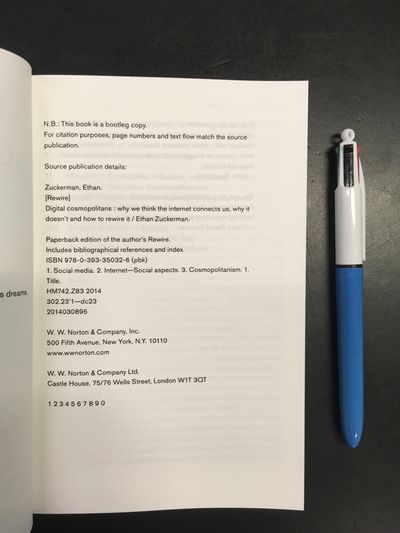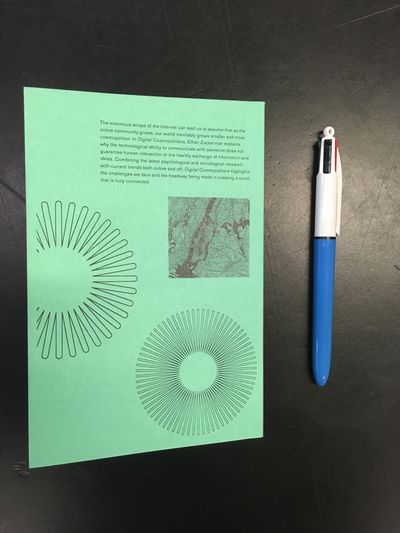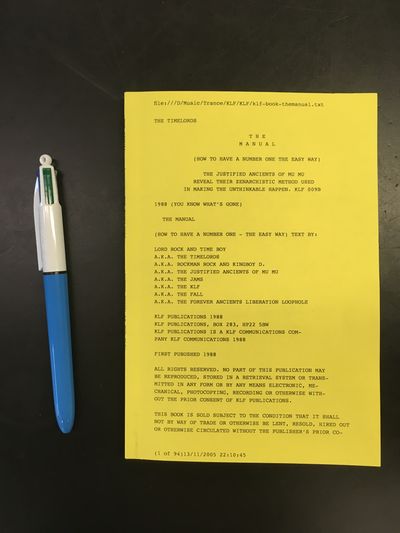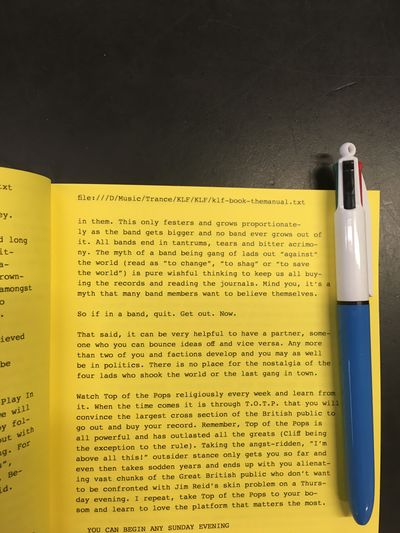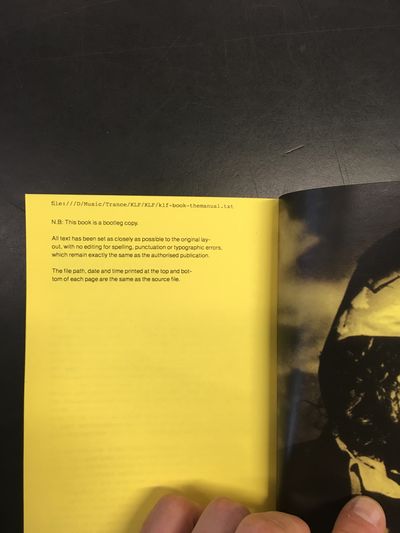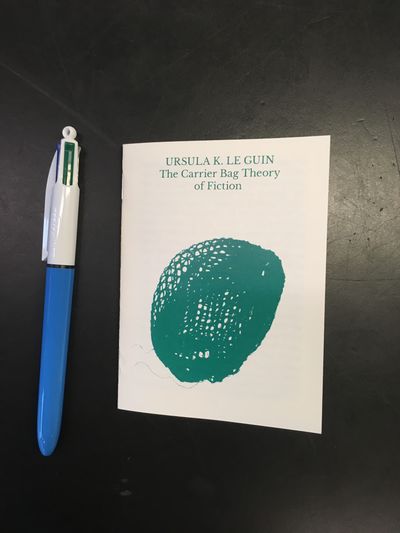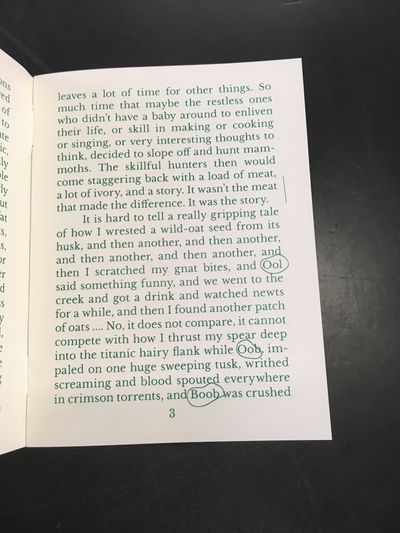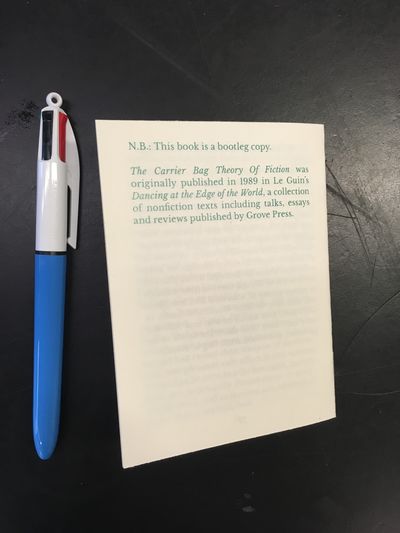User:Simon/Trim4/Bootleg book sprint: Difference between revisions
| Line 32: | Line 32: | ||
Cover stock: Clairefontaine Trophee (white) 120gsm<br> | Cover stock: Clairefontaine Trophee (white) 120gsm<br> | ||
Text stock: Bio Top 80gsm<br> | Text stock: Bio Top 80gsm<br> | ||
Binding: Perfect bound | |||
[[File:ATB_B01.JPG|400px|frameless]] | [[File:ATB_B01.JPG|400px|frameless]] | ||
Revision as of 17:17, 26 September 2019
The idea is to create printed books from digital files, when no analog copy exists. I'm adding these to the physical collection of the bootleg library as I go.
Book 1: Feminist Art Manifestos
12.09.19
Dimensions: 130x180mm
Cover stock: Clairefontaine Trophee (green) 210gsm
Text stock: Bio Top 80gsm
This book took quite some time to lay out. The original publication exists as an EPUB. You have to buy it, and it's not available in this format from the usual pirate libraries, but I did find an HTML version on https://monoskop.org/media/text/feminist_art_manifestos/
I ran pandoc on the HTML file to turn it into a .rtf so that I could lay it out in InDesign using this command:
$ pandoc -s source.html -o new_source.rtf
This retained italics and hyperlinks (which was super nice), but there were lots of line-breaks that I didn't need and had to remove manually as find/change in InDesign is indiscriminate...
In some ways the digital book is superior to the printed version as you can click on the hyperlinks to visit the source pages of many of these texts, something which is obviously impossible in the printed version, although it does say where the manifestos can be found.
The interesting thing about doing this as a book sprint is the speed at which you have to make design decisions. This makes the design quite minimal, and the only typographic conceit here was with a decision to use a variety of indentation styles, which refers to the multiplicity of feminist manifestos. The interesting thing for me about these texts is that they show many different artistic views of feminism which don't necessarily agree with each other.
During the time I was laying out this publication, I was invited by Artemis to join her and Paloma in applying to present our Marginal Conversations workshop in Athens at the ETC (Eclectic Tech Conference) festival. We were all pretty excited about the prospect, however as it turned out, some of the organisers were unsure about me presenting a workshop as a cis-gendered hetero man. Although I was disappointed, I understood the reasoning, as due to the nature of this particular conference (which started as a way for women and queer, trans & non-binary folk to share skills outside of a patriarchal male-dominated tech culture. I was reassured that this was not the opinion of all of the organisers, but of some, however, they were trying to reach a compromise with me and each other. I found this an interesting sidenote to the publication I was producing, in which there is a plurality of views that are allowed to co-exist with each other.
Book 2: Almost Transparent Blue
14.09.19
Dimensions: 112x172mm
Cover stock: Clairefontaine Trophee (white) 120gsm
Text stock: Bio Top 80gsm
Binding: Perfect bound
One of my favourite novels for its striking descriptions of colour. Written by "the other Murakami" (not Haruki). This was a relatively easy case of taking the text from an EPUB I found online. Again, the most tedious thing was removing the soft returns. Once I got through that, I decided to reflect the episodic nature of the novel by beginning every section with a drop cap. Another design decision was in the format - as it is originally a Japanese novel, I wanted to use a specific novel size common in Japan of 112x172mm. The blue square on the cover is a post-it note that I photocopied in single colour - blue; an impromptu decision. The cartridge was running out, which produced a very transparent blue.
Book 3: Rewire: Digital Cosmopolitans in the Age of Connection
19.09.19
Dimensions: 130x180mm
Cover stock: No idea (I found it in the studio) green - around 210gsm?
Text stock: Bio Top 80gsm
Binding: Perfect bound
Artemis messaged me asking if I was in the studio, and if I could find a book of Steve's that was about how the internet makes it seem like we're connected, though we're not. I found Steve's copy, but as Artemis was still in Greece I did a quick search online to see if I could find a digital version. The only one I could find was an EPUB, which I converted to an RTF using pandoc.
This book took quite a while to produce as it was important that the page numbers matched the original publication (for citation purposes), so I painstakingly set the text to the same line count and flow as the original publication. I also included the Library of Congress bibliographic details for this purpose.
Book 4: THE MANUAL
22.09.19
Dimensions: 140x190mm
Cover stock: Rainbow (yellow) 120gsm
Text stock: Rainbow (yellow) 120gsm
Binding: Perfect bound
This book is a rather tongue-in-cheek guide to how to write a hit pop song, made by members of the KLF (Bill Drummond and Jimmy Cauty), who had a hit song in 1988 with "Doctorin' the Tardis". This is a printed book made from a .txt file, found online, and still bearing the file path from the directory it came from as well as date and time of creation. I retained these details for this printed book (only substituting actual numbers for page number and page count) in reference to the provenance of the file, and to be clear about the raw nature of its origin. As a .txt, it doesn't contain any styling or italics and I wanted to retain this crudeness in the design.
There's also an audiobook version, which might be interesting to convert via speech-to-text at some point: https://audioboom.com/posts/1730244-the-manual-on-how-to-get-a-numbet-one-hit-the-easy-way
Book 5: The Carrier Bag Theory of Fiction
25.09.19
Dimensions: 90x120mm
Cover stock: Clairefontaine Trophee (ivory) 120gsm
Text stock: Clairefontaine Trophee (ivory) 120gsm
Binding: Staple bound
Ursula K. Le Guin's short essay appears in a compilation called Dancing at the Edge of the World, which I've found impossible to find online through the usual pirate libraries such as Library Genesis, aaaaaarg.fail and Monoskop. Perhaps this points to a gender bias in what is perceived as knowledge (Le Guin was a woman wrote mostly science-fiction)? In lieu of not being able to find the compilation, I decided to print this book in a very small size (90x120mm) and retain the annotations from the PDF I found. I digitised them by making them into vectors, and printed the text and annotations in green. In this way I wanted to speculate on what would happen when a reader was confronted with annotations that seemed to be part of the source, not a para-text added after publication.

